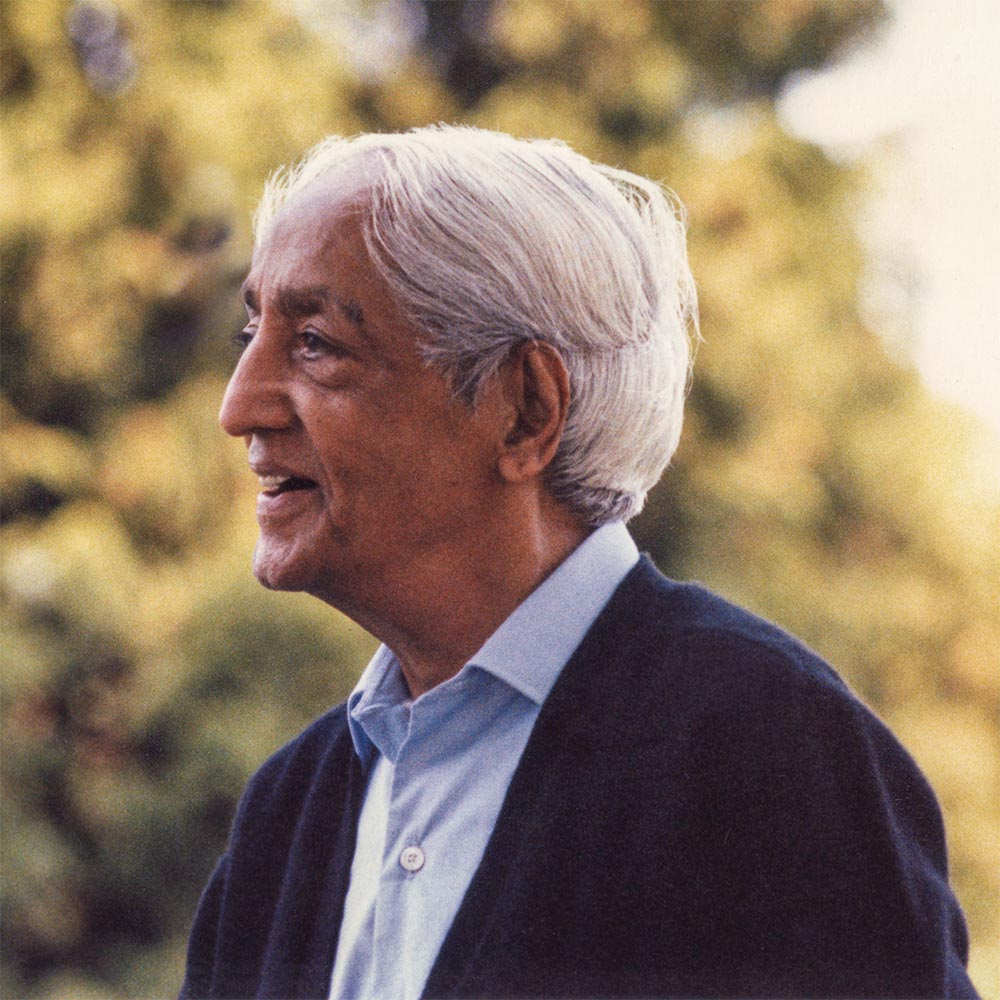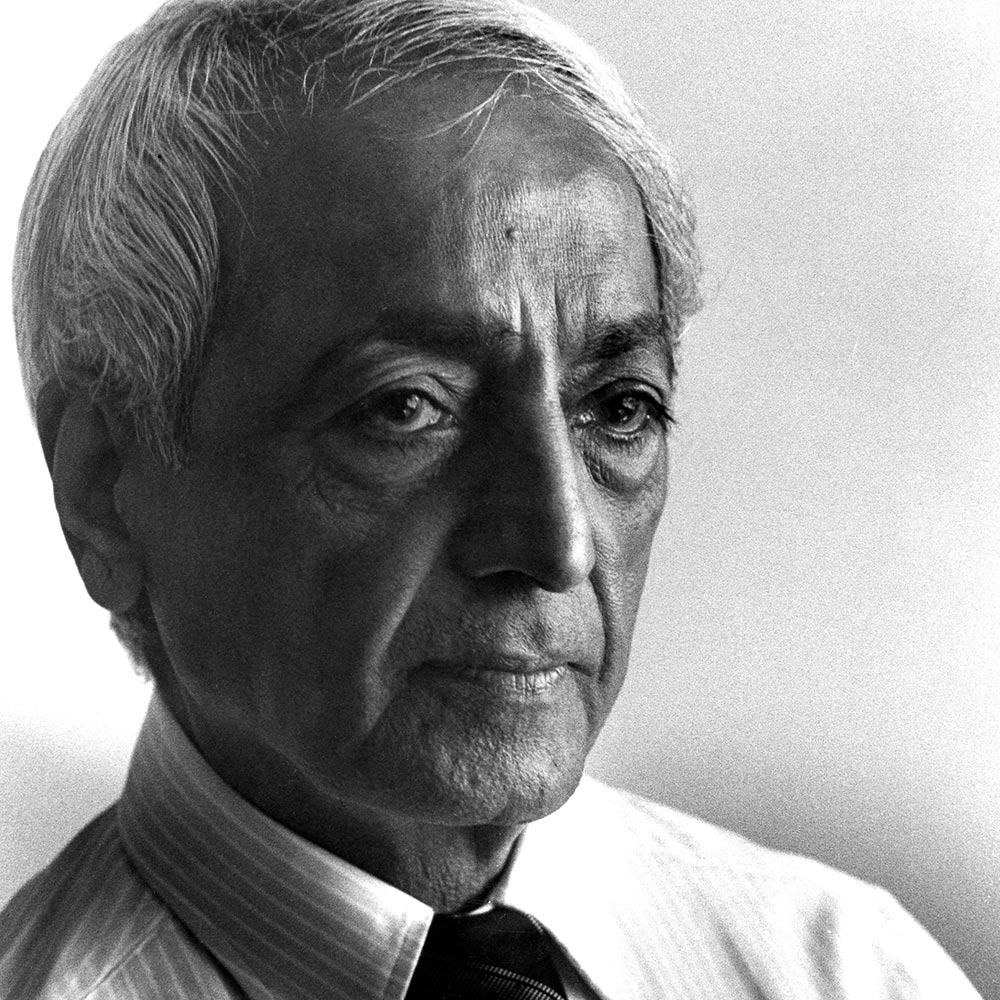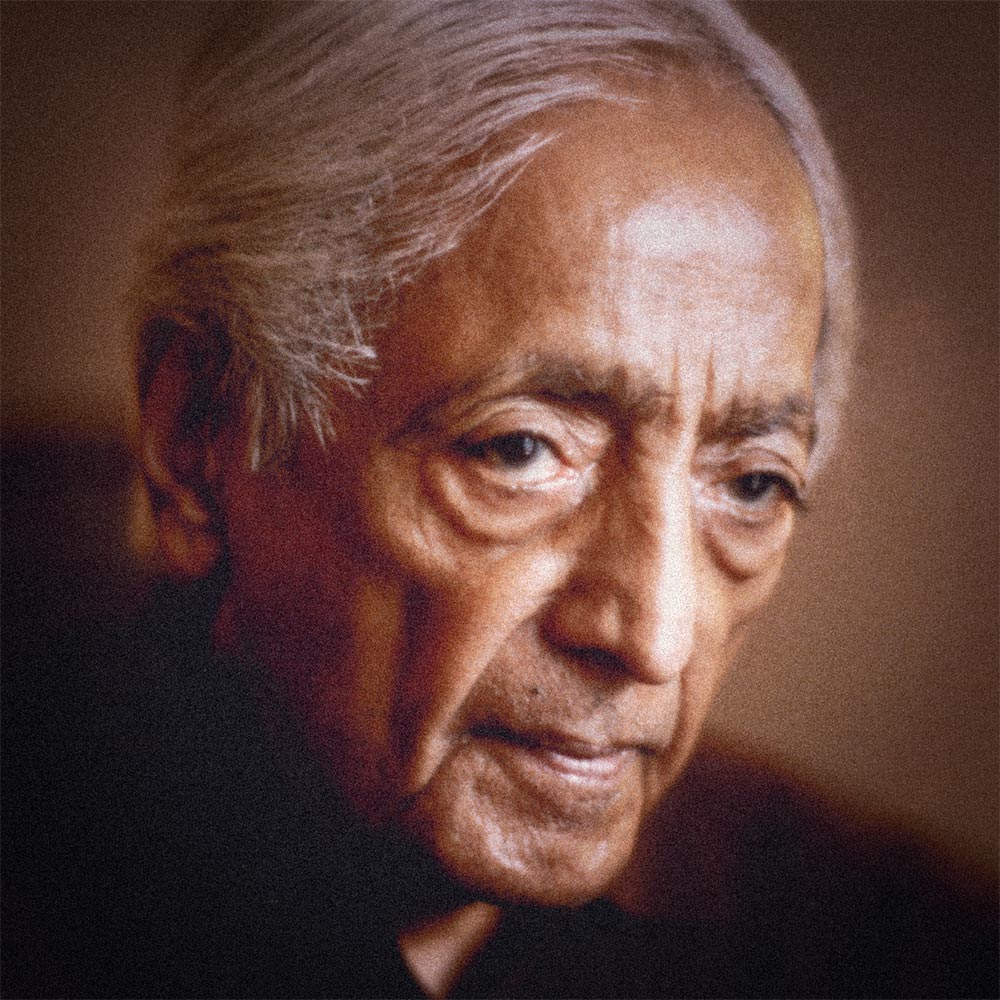The function of education is to help you to grow independently so that you are free of ambition and can find your true vocation.
Krishnamurti, Life Ahead
Read More
What is happening in the world? Everybody is fighting somebody. One man feels less than another and struggles to get to the top. There is no love, there is no consideration, there is no deep thought. Our society is a constant battle of man against man. This struggle is born of the ambition to become somebody, and the older people encourage you to be ambitious. They want you to amount to something, to marry someone rich, to have influential friends. Being frightened, ugly in their hearts, they try to make you like themselves; and you in turn want to be like them because you see the glamour of it all. When someone famous comes, everybody bows down to receive him. He loves it, and you love it too. You feel honoured if you know someone connected to him, and you bask in the sunshine of his ambition and achievements. So you are easily caught in the ugly web of the older generation, in the pattern of this monstrous society. Only if you are very alert, constantly watchful, only if you are not afraid and do not accept, but question all the time, only then will you not be caught, but go beyond and create a different world. That is why it is very important for you to find your true vocation. Vocation means something you love to do, which is natural to you. After all, the function of education is to help you to grow independently so that you are free of ambition and can find your true vocation. The ambitious man has never found his true vocation; if he had, he would not be ambitious.
What HAS ambition done in the world? When you see a man struggling to gain, to achieve, to get ahead of somebody else, have you ever asked yourself what is in his heart?
Krishnamurti, Life Ahead
Read More
it, and ambition becomes the means through which he can escape.
Ambition, desire and fulfilment inevitably lead to frustration and sorrow.
Krishnamurti, Think on These Things
Read More
Society, as presently constituted, is based on ambition and conflict. Almost everyone accepts this fact as inevitable.
Krishnamurti, Commentaries on Living 2
Read More
In love there is no ambition.
Krishnamurti, Life Ahead
Read More
A mind that is not concerned with itself, that is free of ambition, a mind that not caught up in its own desires or driven by its own pursuit of success, such a mind is not shallow, and it flowers in goodness.
Krishnamurti, Think on These Things
Read More
All ambition, all desire for success in any direction, creates conflict within and without.
Krishnamurti, Commentaries on Living 2
Read More
Ambition breeds mediocrity of mind and heart. Ambition is superficial, for it is everlastingly seeking a result.
Krishnamurti, Commentaries on Living 2
Read More
Can you live in this world completely without ambition, never comparing yourself to another?
Krishnamurti, The Awakening of Intelligence
Read More
Each lives in their own ambition, in personal and egotistic pursuits, in their own cocoon.
Krishnamurti, The Awakening of Intelligence
Read More
Ambition is at work, ruthless, jealous, feudal.
Krishnamurti, Commentaries on Living 2
Read More
Perfection is a glorified form of success, and ambition is blessed by respectability and the representatives and heroes of success.
Read More
If WE would live at peace with each other, ambition must completely come to an end.
Krishnamurti, The First and Last Freedom
Read More
Ambition has you by the throat.
Read More
To love, there must be the putting aside of ambition, greed and envy.
Krishnamurti, Commentaries on Living 3
Read More
These quotes only touch on the many subjects Krishnamurti inquired into during his lifetime. His timeless and universal teachings can be explored using the Index of Topics where you will find texts, audio and video related on many themes. Another option is to browse our selection of curated articles or more short quotes. Krishnamurti’s reply when asked what lies at the heart of his teachings can be found here. Many Krishnamurti books are available, a selection of which can be explored here. To find out more about Krishnamurti’s life, please see our introduction and the biography. We also host a weekly podcast, and offer free downloads. Please visit our YouTube channel for hundreds of specially selected shorter clips. Below, you can learn more about Krishnamurti and our charity which he founded in 1968.

Who Was Krishnamurti?
J. Krishnamurti (1895-1986) is widely regarded as one of the greatest thinkers and religious teachers of all time. He spoke throughout the world to large audiences and to individuals, including writers, scientists, philosophers and educators, about the need for a radical change in mankind. Referring to himself, Krishnamurti said:
He is acting as a mirror for you to look into. That mirror is not an authority. It has no authority, it’s just a mirror. And when you see it clearly, understand what you see in that mirror, then throw it away, break it up.
Krishnamurti was concerned with all humanity and held no nationality or belief and belonged to no particular group or culture. In the latter part of his life, along with continuing to give public talks, he travelled mainly between the schools he had founded in India, Britain and the United States, which educate for the total understanding of man and the art of living. He stressed that only this profound understanding can create a new generation that will live in peace.
Krishnamurti reminded his listeners again and again that we are all human beings first and not Hindus, Muslims or Christians, that we are like the rest of humanity and are not different from one another. He asked that we tread lightly on this earth without destroying ourselves or the environment. He communicated to his listeners a deep sense of respect for nature. His teachings transcend man-made belief systems, nationalistic sentiment and sectarianism. At the same time, they give new meaning and direction to mankind’s search for truth. His teaching is timeless, universal and increasingly relevant to the modern age.
I am nobody. It is as simple as that. I am nobody. But what is important is who you are, what you are.
Krishnamurti
Krishnamurti spoke not as a guru but as a friend. His talks and discussions are based not on tradition-based knowledge but on his own insights into the human mind and his vision of the sacred, so he always communicated a sense of freshness and directness, although the essence of his message remained unchanged over the years. When Krishnamurti addressed large audiences, people felt that he was talking to each of them personally, addressing their own particular problem. In his private interviews, he was a compassionate teacher, listening attentively to those who came to him in sorrow, and encouraging them to heal themselves through their own understanding. Religious scholars found that his words threw new light on traditional concepts. Krishnamurti took on the challenge of modern scientists and psychologists and went with them step by step, discussing their theories and sometimes enabling them to discern the limitations of their theories.
Krishnamurti left a large body of literature in the form of public talks, writings, discussions with teachers and students, scientists, psychologists and religious figures, conversations with individuals, television and radio interviews, and letters. Many of these have been published as books, in over 60 languages, along with hundreds of audio and video recordings.

The Krishnamurti Foundation
Established in 1968 as a registered charity, and located at The Krishnamurti Centre, Krishnamurti Foundation Trust exists to preserve and make available Krishnamurti’s teachings.
The Foundation serves a global audience by providing worldwide free access to Krishnamurti videos, audio and texts to those who may be interested in pursuing an understanding of Krishnamurti’s work in their own lives.
In describing his intentions for the Foundations, Krishnamurti said:
The Foundations will see to it that these teachings are kept whole, are not distorted, are not made corrupt.

